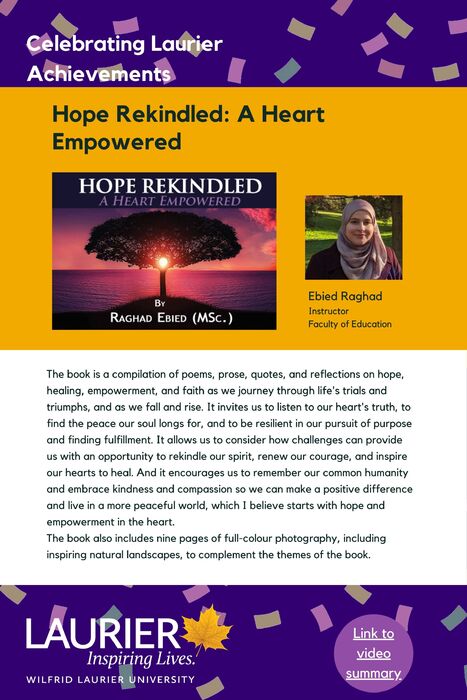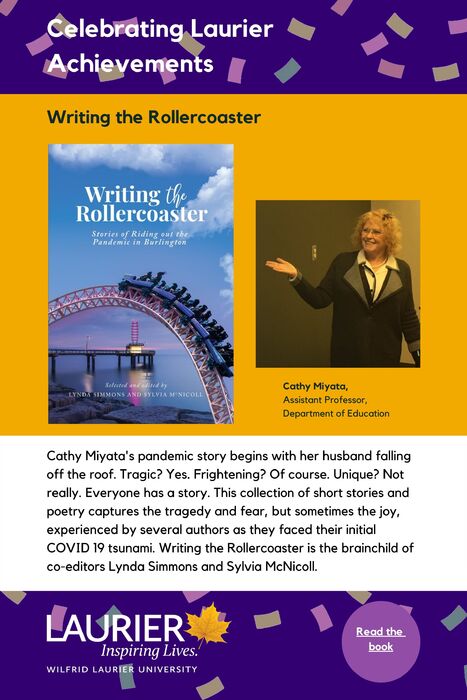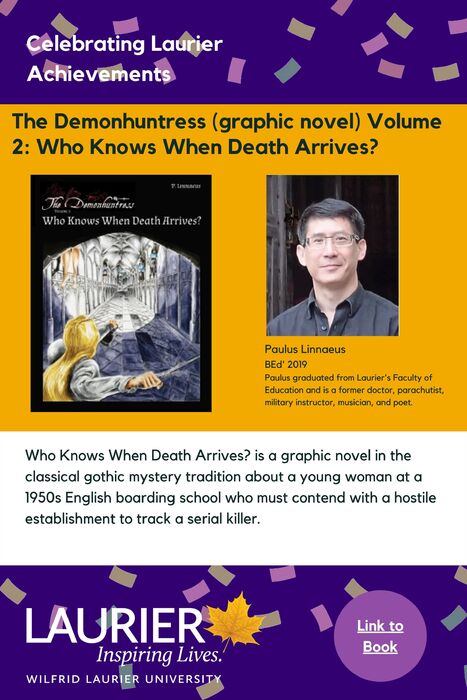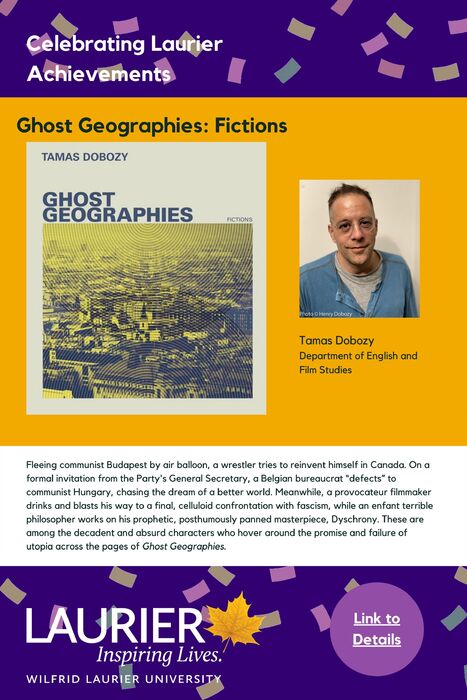-
 Hope Rekindled: A Heart Empowered
Hope Rekindled: A Heart Empowered The book is a compilation of poems, prose, quotes, and reflections on hope, healing, empowerment, and faith as we journey through life's trials and triumphs, and as we fall and rise. It invites us to listen to our heart's truth, to find the peace our soul longs for, and to be resilient in our pursuit of purpose and finding fulfillment. It allows us to consider how challenges can provide us with an opportunity to rekindle our spirit, renew our courage, and inspire our hearts to heal. And it encourages us to remember our common humanity and embrace kindness and compassion so we can make a positive difference and live in a more peaceful world, which I believe starts with hope and empowerment in the heart.
The book also includes nine pages of full-colour photography, including inspiring natural landscapes, to complement the themes of the book.
-
 Amidst this Storm
Amidst this Storm
-
 The Demonhuntress (graphic novel) Volume 2: Who Knows When Death Arrives?
The Demonhuntress (graphic novel) Volume 2: Who Knows When Death Arrives? Who Knows When Death Arrives? is a graphic novel in the classical gothic mystery tradition about a young woman at a 1950s English boarding school who must contend with a hostile establishment to track a serial killer.
-
 Older Sister. Not Necessarily Related
Older Sister. Not Necessarily Related Winner of the 2019 Hilary Weston Writers' Trust Prize for Nonfiction A beautiful and haunting memoir of kinship and culture rediscovered. Jenny Heijun Wills was born in Korea and adopted as an infant into a white family in small-town Canada. In her late twenties, she reconnected with her first family and returned to Seoul where she spent four months getting to know other adoptees, as well as her Korean mother, father, siblings, and extended family. Older Sister. Not Necessarily Related. describes in visceral, lyrical prose the painful ripple effects that follow a child's removal from a family, and the rewards that can flow from both struggle and forgiveness.
-
 Ghost Geographies: Fictions
Ghost Geographies: Fictions Fleeing communist Budapest by air balloon, a wrestler tries to reinvent himself in Canada. On a formal invitation from the Party's General Secretary, a Belgian bureaucrat “defects” to communist Hungary, chasing the dream of a better world. Meanwhile, a provocateur filmmaker drinks and blasts his way to a final, celluloid confrontation with fascism, while an enfant terrible philosopher works on his prophetic, posthumously panned masterpiece, Dyschrony. These are among the decadent and absurd characters who hover around the promise and failure of utopia across the pages of Ghost Geographies.
 Hope Rekindled: A Heart Empowered The book is a compilation of poems, prose, quotes, and reflections on hope, healing, empowerment, and faith as we journey through life's trials and triumphs, and as we fall and rise. It invites us to listen to our heart's truth, to find the peace our soul longs for, and to be resilient in our pursuit of purpose and finding fulfillment. It allows us to consider how challenges can provide us with an opportunity to rekindle our spirit, renew our courage, and inspire our hearts to heal. And it encourages us to remember our common humanity and embrace kindness and compassion so we can make a positive difference and live in a more peaceful world, which I believe starts with hope and empowerment in the heart. The book also includes nine pages of full-colour photography, including inspiring natural landscapes, to complement the themes of the book.
Hope Rekindled: A Heart Empowered The book is a compilation of poems, prose, quotes, and reflections on hope, healing, empowerment, and faith as we journey through life's trials and triumphs, and as we fall and rise. It invites us to listen to our heart's truth, to find the peace our soul longs for, and to be resilient in our pursuit of purpose and finding fulfillment. It allows us to consider how challenges can provide us with an opportunity to rekindle our spirit, renew our courage, and inspire our hearts to heal. And it encourages us to remember our common humanity and embrace kindness and compassion so we can make a positive difference and live in a more peaceful world, which I believe starts with hope and empowerment in the heart. The book also includes nine pages of full-colour photography, including inspiring natural landscapes, to complement the themes of the book. Amidst this Storm
Amidst this Storm  The Demonhuntress (graphic novel) Volume 2: Who Knows When Death Arrives? Who Knows When Death Arrives? is a graphic novel in the classical gothic mystery tradition about a young woman at a 1950s English boarding school who must contend with a hostile establishment to track a serial killer.
The Demonhuntress (graphic novel) Volume 2: Who Knows When Death Arrives? Who Knows When Death Arrives? is a graphic novel in the classical gothic mystery tradition about a young woman at a 1950s English boarding school who must contend with a hostile establishment to track a serial killer. Older Sister. Not Necessarily Related Winner of the 2019 Hilary Weston Writers' Trust Prize for Nonfiction A beautiful and haunting memoir of kinship and culture rediscovered. Jenny Heijun Wills was born in Korea and adopted as an infant into a white family in small-town Canada. In her late twenties, she reconnected with her first family and returned to Seoul where she spent four months getting to know other adoptees, as well as her Korean mother, father, siblings, and extended family. Older Sister. Not Necessarily Related. describes in visceral, lyrical prose the painful ripple effects that follow a child's removal from a family, and the rewards that can flow from both struggle and forgiveness.
Older Sister. Not Necessarily Related Winner of the 2019 Hilary Weston Writers' Trust Prize for Nonfiction A beautiful and haunting memoir of kinship and culture rediscovered. Jenny Heijun Wills was born in Korea and adopted as an infant into a white family in small-town Canada. In her late twenties, she reconnected with her first family and returned to Seoul where she spent four months getting to know other adoptees, as well as her Korean mother, father, siblings, and extended family. Older Sister. Not Necessarily Related. describes in visceral, lyrical prose the painful ripple effects that follow a child's removal from a family, and the rewards that can flow from both struggle and forgiveness. Ghost Geographies: Fictions Fleeing communist Budapest by air balloon, a wrestler tries to reinvent himself in Canada. On a formal invitation from the Party's General Secretary, a Belgian bureaucrat “defects” to communist Hungary, chasing the dream of a better world. Meanwhile, a provocateur filmmaker drinks and blasts his way to a final, celluloid confrontation with fascism, while an enfant terrible philosopher works on his prophetic, posthumously panned masterpiece, Dyschrony. These are among the decadent and absurd characters who hover around the promise and failure of utopia across the pages of Ghost Geographies.
Ghost Geographies: Fictions Fleeing communist Budapest by air balloon, a wrestler tries to reinvent himself in Canada. On a formal invitation from the Party's General Secretary, a Belgian bureaucrat “defects” to communist Hungary, chasing the dream of a better world. Meanwhile, a provocateur filmmaker drinks and blasts his way to a final, celluloid confrontation with fascism, while an enfant terrible philosopher works on his prophetic, posthumously panned masterpiece, Dyschrony. These are among the decadent and absurd characters who hover around the promise and failure of utopia across the pages of Ghost Geographies.